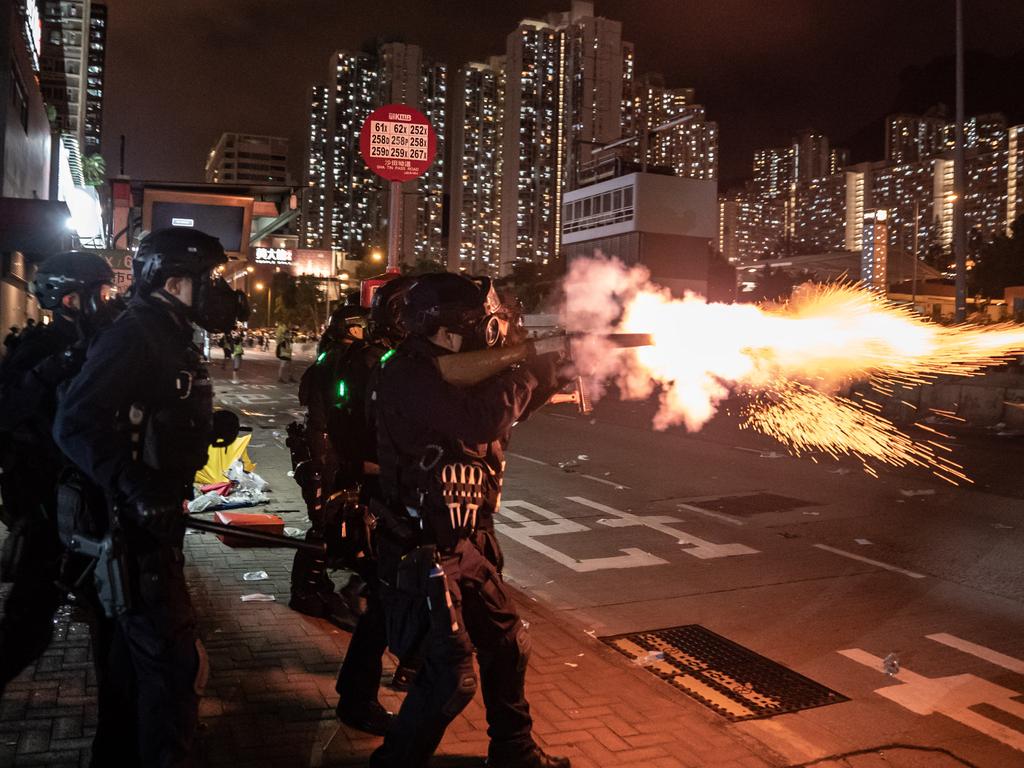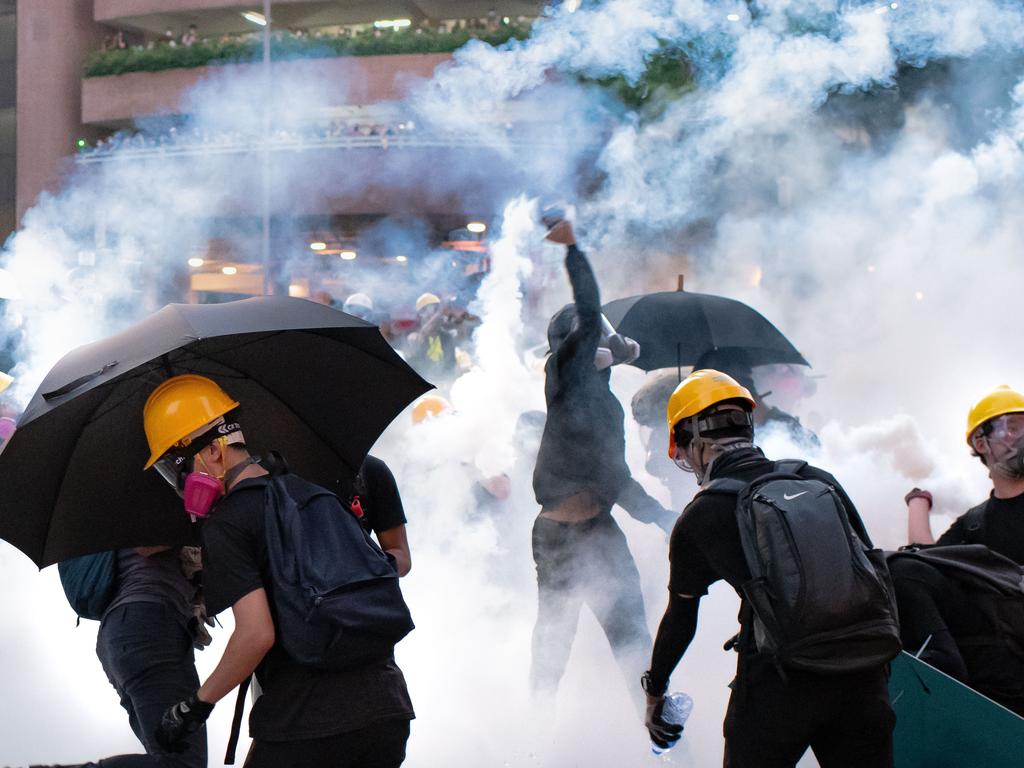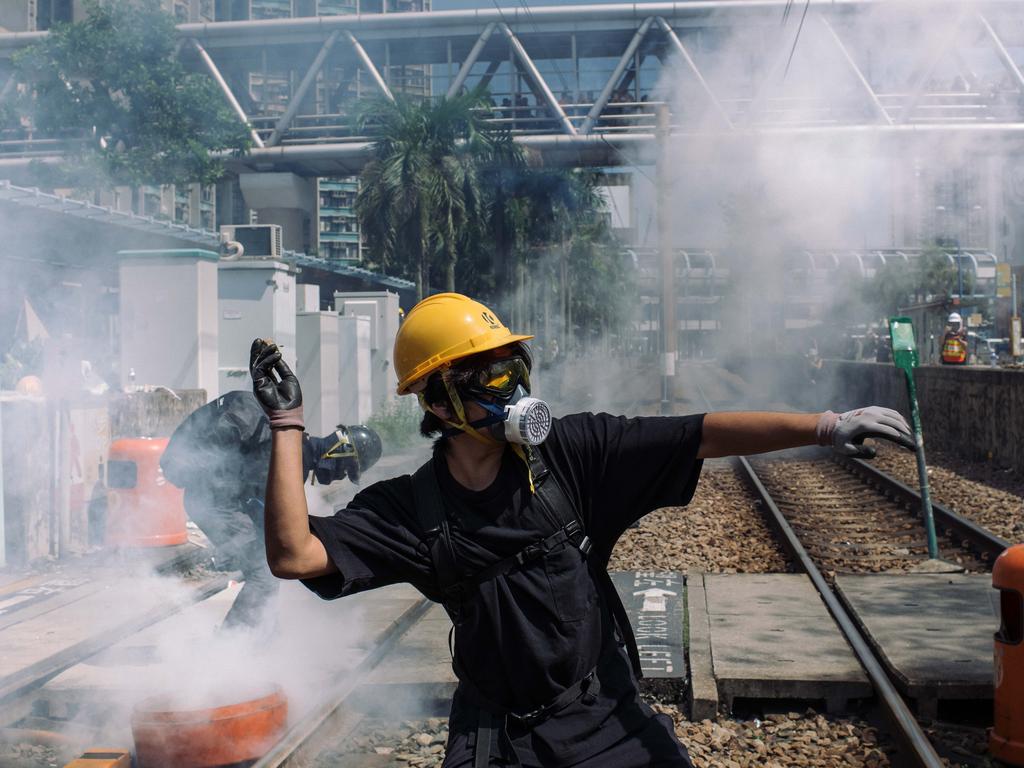‘We will not sit idly by’: Beijing’s chilling warning to Hong Kong
As Hong Kong’s protests drag on, Beijing is losing patience — and they’re marshalling forces to stamp out the “intolerable” dissidence.
Hong Kong’s protests are evolving. They’re no longer about interference in local government. They’re demanding an end to integration with China.
Now Beijing’s patience is running out — with warnings the demonstrations have entered a “most dangerous phase”.
But most dangerous to whom?
“Even 100 soldiers in the central business district, if they suddenly appeared on the front page of all major newspapers, would have a very chilling impact on multinational companies based in Hong Kong,” Willy Lam, adjunct professor at the Chinese University of Hong Kong told CNN.
China’s official Xinhua news agency published an editorial yesterday saying “ugly forces” were threatening the country’s “bottom line”.
Those “ugly forces” are Hong Kong’s pro-democracy protesters.
“The central government will not sit idly by and let this situation continue,” the agency wrote, as China’s military repeated assertions that it is ready to quell the “intolerable” unrest if ordered.
There is, as yet, no sign the military plans to deploy. But fears of such an intervention have spread through the city’s inhabitants.
The sound of Chinese People’s Liberation Army boots on Hong Kong streets would be “unimaginably detrimental”, Professor Lam says. He warns it would lead to a Hong Kong stock market crash, a housing price collapse - and a mass exodus of businesses and even residents.
And such turmoil in what is generally regarded as one of the world’s most significant financial hubs would ripple through a Chinese economy already struggling from excessive debts and a trade war with the United States.
DAVID VERSUS GOLIATH
The Hong Kong unrest is the most significant revolt against Beijing’s rule in decades. It’s also a direct challenge of the Chinese Communist Party’s growing influence.
Now Beijing is pushing back.
“Neither the central government nor the 1.4 billion Chinese people will allow the complete collapse of the rule of law in Hong Kong,” a state-sponsored editorial reads. “A few radical protesters may temporarily disrupt the order of things, but they can never take over this city. There is no way they can take control, nor rewrite the law and rules of Hong Kong according to their will.”
However, adhering to those laws is at the very heart of the dispute.
Under the 1997 handover deal with Britain, Hong Kong maintains its colonial-era democratic rights and civil liberties — including an independent judiciary and freedom of speech. These are not available on the mainland under the Chinese Communist Party (CCP), where the legal system is widely regarded to be a tool to intimidate dissidents and impose Beijing’s will.
But, in 2047, Hong Kong is due to merge with China’s legal system and government fully.
Now in its ninth week, the protests — sparked by moves to extradite Hong Kong citizens to China for trial under Communist Party laws — have sparked a surge in violence.
Over the past fortnight, police have been regularly firing rubber bullets and tear gas into crowds of masked, umbrella-wielding demonstrators.
Protesters remain, however, undeterred.
‘VERY DANGEROUS SITUATION’
Hong Kong’s defiance is an increasing embarrassment for Beijing, which is unused to not being able to employ its tactics of blanket censorship, arbitrary arrest and overwhelming force.
Beijing-backed Hong Kong Chief Executive Carrie Lam last night used Communist Party rhetoric to condemn the protests, saying they “disrespected national dignity”.

“Such extensive disruptions in the name of certain demands or uncooperative movement has seriously undermined Hong Kong’s law and order and are pushing our city, the city that we all love, and many of us helped to build, to the verge of a very dangerous situation,” Ms Lam said.
“The only thing to deal with violence is not to do anything to give way to more violence … The only way to deal with it is to rely on the rule of law.”
But concerns over the rule of law are what sparked the protests in the first place.
Now some Hong Kong residents are daring to voice their desire for a divorce from Beijing.
This has angered China’s authoritarian rulers who regularly stamp down hard on talk of independence. Ms Lam says chants calling for revolution are a direct challenge to China’s sovereignty
“Some even wantonly said they want to revive (an independent) Hong Kong,” the chief minister warned. “This is destroying the lives of seven million Hongkongers that we treasure. Under such circumstances, things will only turn worse if we indulge with them.”
CLASH OF CIVILISATIONS
Yesterday Hong Kong’s civil service initiated a general strike in support of the pro-democracy protesters. This has resulted in significant delays at the city’s airport and harbour and disrupted financial institutions.
While small groups of protesters hurl projectiles and deface public property, most engage in more simple acts of civil disobedience — such as blocking intersections and preventing the doors on trains from closing.
China’s state-controlled media, however, warns the protesters are approaching a dangerous phase.
“Assaulting police officers and desecrating the flag are both felony offences. However, the mob is becoming bolder, which spurs them on to flout the laws,” an editorial in the Global Times reads.
It warns of long-term consequences.
“One of the most effective ways to regain control of the situation is to arrest the radicals,” the editorial reads. “Even when they cannot make on-site arrests, police can gather evidence and track down the suspects. It may be a lengthy process to bring the thugs to justice, but making on-site arrests will be a good deterrent for radical protesters.”
But protesters are finding ways to foil Beijing’s “Big Brother” facial-recognition surveillance systems.
Low-tech countermeasures include face masks, goggles, hard hats and umbrellas. Recently, protesters have been taking to the streets with pen lasers to blind camera systems.

Demonstrators have also developed ways of countering tear gas, using readily available traffic cones to contain the canisters and douse their fumes.
And any mobile phone apps developed in China have been deleted for fear of surveillance.
UNCERTAIN FUTURE
Ms Lam last night refused to resign.
“I don’t think at this point in time resignation of myself or some of my colleagues will provide a better solution,” Ms Lam told a press conference.
Ms Lam has remained mostly invisible since the unrest erupted shortly after the 30th anniversary of the Tiananmen Square massacre in June. But she has dismissed the option of activating Chinees troops garrisoned in the city.
“Lam was unmoved by a million-person march but did shift her position and suspend the extradition bill when faced with a street confrontation,” writes University of Sydney Policy Lab researcher Amanda Tattersall. “This sent a loud message to the protesters about what it will take to win under her authoritarian government — militancy was more potent than passive protest.”
Which may explain the unrelenting, flowing nature of Hong Kong’s rebellion.
The island’s citizens are naturally divided and concerned for the future.
“Some of them are prepared to die for the movement,” a demonstrator known only as Chloe told the Wall Street Journal. “I am also willing to die for it.”
Others aren’t so sure.
“I’m more worried than hopeful,” Florence Tung, a 22-year-old trainee lawyer who was among the thousands marching through Tseung Kwan O told AFP. “It’s like no matter how much us citizens do, we cannot change the government,” referring to the city’s unelected pro-Beijing leaders.

The stakes remain incredibly high.
“What is certain is that a longstanding democracy movement has powerfully connected to the next generation,” Ms Tattersall writes. “Young students are terrified about their future and feel they have to do everything they can to fight for their rights.”
Beijing, meanwhile, continues to heap scorn on Hong Kong’s desire to retain its civil liberties.
“The radicals are nothing but cowards trapped by utopian illusions,” the Global Times states. “Only can relentless law enforcement wake them up so they will realise that Hong Kong has never abandoned the rule of law or the force to defend it.”
Jamie Seidel is a freelance writer. Continue the conversation @JamieSeidel



